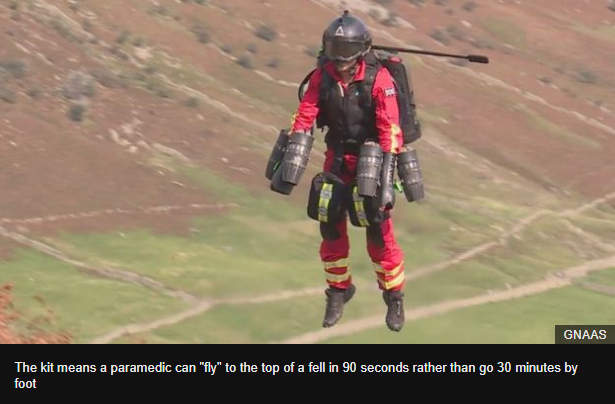The first jet suit that paramedics can use to easily respond to emergency situations in the rugged Lake District was tested recently in UK by the Great North Air Ambulance Service (GNAAS). This idea came from its director, Andy Mawson, where the suit can make a medic fly and reach patients in minutes. The trial for the jet suit also showed a huge potential in providing critical care services.
BBC News: Using the jet pack, what might have taken up to an hour to reach the patient may only take a few minutes, and that could mean the difference between life and death

According to BBC News, after a year of talks between GNAAS and Gravity Industries, a first test flight was carried out in the Lake District.
The test flight was carried out by Richard Browning, founder of Gravity Industries.
Andy Mawson, director of operations at GNAAS, said that “if the idea takes off, the flying paramedic will be armed with a medical kit, with strong pain relief for walkers who may have suffered fractures, and a defibrillator for those who may have suffered a heart attack. In a jet pack, what might have taken up to an hour to reach the patient may only take a few minutes, and that could mean the difference between life and death.”

New York Post: The flying paramedic will be armed with a medical kit, with strong pain relief for walkers who may have suffered fractures, and a defibrillator for those who may have suffered a heart attack

In an interview by New York Post, Richard Browning, founder of the UK’s Gravity Industries, said that when he tested the jet suits, he was able to reach a 10-year-old girl in a simulated fall in just 90 seconds.
It would have taken 25 minutes for first responders to cover the treacherous path on foot, according to the company.
On the other hand, Director of GNAAS, Andy Mawson said that the flying paramedic will be armed with a medical kit, with strong pain relief for walkers who may have suffered fractures, and a defibrillator for those who may have suffered a heart attack.
“In a jet pack, what might have taken up to an hour to reach the patient may only take a few minutes, and that could mean the difference between life and death,” Mawson continued.
[content-egg module=Viglink template=grid]








